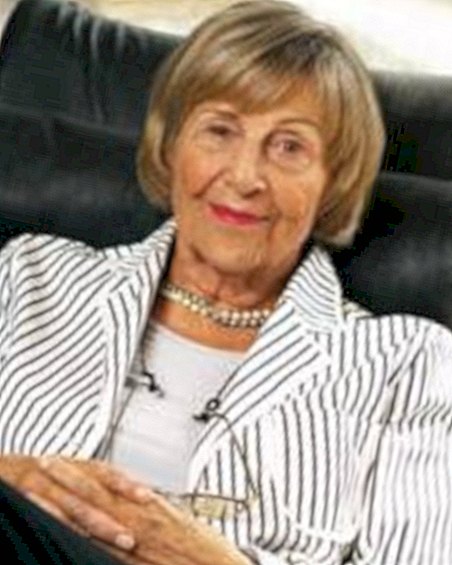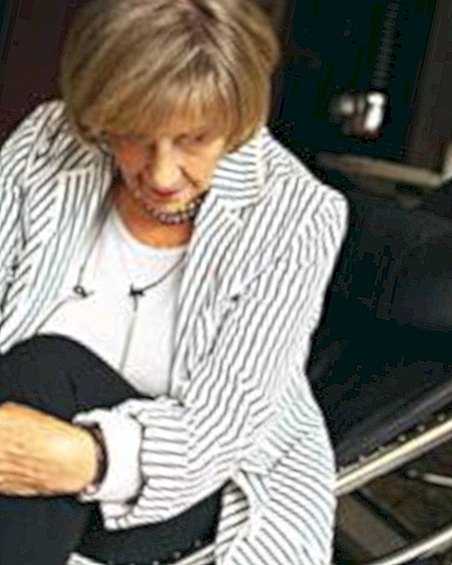Financial Crisis: How to deal with your fear

ChroniquesDuVasteMonde: Dr. med. Mitscherlich, how are you when you think of your savings at the moment?
Margarete Mitscherlich: As you know, I am 91, so very old and in that sense very well off. I experienced my father when the bank where he had all his money went bankrupt in the early 1920s. He was a doctor and no longer the youngest; he had five children to look after, and the social security we know today did not exist then. He laid his head on the table and cried. It was the first and only time that I heard my father sob, and that made me very strange as a four-and-five-year-old child. In view of the current situation, I feel quite uneasy, but I do not care less about it because of my situation: I can not imagine that it will be so bad that I can not end my life until the end, besides, I have too a family that would support me

Margarete Mitschelich
ChroniquesDuVasteMonde: Do you consider the fear that haunts many people to be justified and appropriate?
Margarete Mitscherlich: I think so, that she is. This is not about the claustrophobic's fear of being confined, but about something very real, about losing money and work. On the other hand, many are also afraid of a panic, a general headlessness that causes everyone who has not yet started the journey to hell, and ultimately the collapse that everyone is afraid of.
ChroniquesDuVasteMonde: Of course, it's hard not to panic when one horror message chases the next. And it is also understandable that one feels at least the impulse to bring his sheep as quickly as possible to dry.
Margarete Mitscherlich: Nevertheless, one should keep his head as functional as possible, think and make it clear: If I do this now, we are all the devil. You should not only think for yourself, but also for the community in which we live. Recognize that we all depend on each other and each one has a responsibility to ensure that our financial and banking system does not collapse. We experienced 1929 what it leads to when people panic. Thankfully, the situation seems to be even more manageable than it was then. Things are still in the hands of the thoughtful.
ChroniquesDuVasteMonde: Currently, the global economic crisis is often remembered at the beginning of the 30s. Does not that fuel the fear in addition?
Margarete Mitscherlich: I think that's very, very questionable. For old people like me, who have experienced this desolation, no doubt, but for all the others it's just pictures and words, not reality suffered by hunger and despair. That's a big difference. Quite apart from that, I think that remembering comes a little late. It would have been possible again and again to realize that the economic system in which we live and, so far, not bad, is something very fragile. And if we, whether bankers, politicians or citizens, only realize in the light of the current situation, how much we all depend on the functioning of this system, then we were unfortunately previously stupid. But what has not been there for a long time, what went well for a long time, we just do not think about it. We forget that, just as we forget death.

ChroniquesDuVasteMonde: Does not the character of this crisis also seem so scary? Their impenetrability, the incalculability of their consequences?
Margarete Mitscherlich: Every insecurity is frightening. Why do we fear dying? Because we do not know what death is like, what comes next, because we can not believe it. Dying and insecurity is one thing, and what is happening is a kind of dying.
ChroniquesDuVasteMonde: And how do you manage to get your fear under control?
Margarete Mitscherlich: At first, fear is not fundamentally bad. It makes us think and ask questions, balance risks, be as rational as possible about life, about others and ourselves. Without fear we degenerate. But if you let yourself be captured by her, she will make you blind and helpless. Look at children: children are much more afraid than adults because they overlook less. That is to say, we must strive to overlook as much as possible by using our minds, gathering information and knowledge before running away, by asking people who know more than we can and can help us to do so make the smartest decision.
ChroniquesDuVasteMonde: Not exactly an exorbitantly large room for maneuver. , ,
Margarete Mitscherlich: Yes, but you also have to live with the unpredictable.Life in itself means insecurity, you can never overlook everything, things will always happen that will upset everything, and you have no choice but to endure this fact to the end. This does not mean abandoning blind trust or recklessness, but trying to make the best possible provision, to equip oneself, with good advisers and through independent thinking. Quite apart from that, one should not even talk about the Apocalypse. We had the total collapse of the Second World War, nothing worked anymore, everything was destroyed, and yet it went on.
ChroniquesDuVasteMonde: A small consolation when I'm afraid of losing my money and job. , ,
Margarete Mitscherlich: If you keep on fantasizing, you lose your head. Sure, the economy will go down, many will lose a lot, and somehow we'll have to deal with that. But the world does not go down, and your head knows that too.
ChroniquesDuVasteMonde: Unfortunately, those who could give advice now do not seem to be particularly trustworthy. The professionals, the bankers and investment advisors, have brought us into this situation.
Margarete Mitscherlich: That's a bit short, I think. We also have to realize that in the run-up to the event, we may have trusted something too much.

ChroniquesDuVasteMonde: You mean that investors are guilty of their misery?
Margarete Mitscherlich: People have that certain tendency to shirk responsibility, to demand that others take over thinking for them, and to trust blindly, rather than independently thinking about how things work. According to the motto: "Dad and mom will already know what they are doing." And if it goes wrong, you rant on dad or mom who would have saved us from the disaster, please. But we are not kids, damn it! We are all adults and have to take responsibility for ourselves.
ChroniquesDuVasteMonde: Unfortunately, the financial and economic system is extremely complicated. I do not even understand my tax return.
Margarete Mitscherlich: Of course we can not know everything. In fact, the connections are far too complex. Even bankers and stock market professionals do not fully understand them. But you have to set the will to know as an ideal. Each one of us can and must make do with it, so that he does not rely solely on good faith, but at least he can ask the right questions before he does business, builds or invests his savings in a particular paper. Unfortunately, we all have to give up our childishness.
ChroniquesDuVasteMonde: Many are now not only afraid, but also anger, saying that they have been wrongly advised or simply: "We, the little people, have been shit from those up there again." Can you understand this anger?
Margarete Mitscherlich: That some consultants or managers have not given enough thought to whether all their business and referrals are even responsible, that they have been driven by greed for money or even recognition, perhaps even exploited weaknesses of the system to their advantage , of course, is incredible. Of course you can be angry, rightly so. One may also let this anger out, but to limit itself only uses nobody. And to blame others alone, while human, only leads to helplessness and resentment. One should use the power of this affect to reflect, to think together, what to do now, how one's personal behavior can influence the situation for the better now and in the future. One has to ask oneself: what exactly happened, what was the other guilt, and what else could I possibly have failed to do through excessive trust, where did I let myself be blinded, did not realize that big earnings promises were accompanied by a higher risk? One has to ask which of the supposed professionals have actually failed instead of shaking everyone off. Again, when emotions such as anger and fear make you think, it's good. If they only lead to looking for culprits, it is bad. If they lead to total headlessness, it is a disaster.
ChroniquesDuVasteMonde: Now it is said again and again, the state and business would have to do anything to rebuild the trust of the people in the financial market. , ,
Margarete Mitscherlich: No, no, no! We are not allowed to build trust any more and then just rely on it all to work out somehow. We should use this crisis to learn from it: that we all have to feel responsible, that we need to learn as much as possible about how the financial market works at all, so that we are better able to do what we do and to respect the other. And we must learn that we do not get our wealth for nothing, but it is made possible by a market that has many burglaries.
ChroniquesDuVasteMonde: What do you think of the demand of politicians like Peer Steinbrück for stronger regulation and greater transparency of international financial markets?
Margarete Mitscherlich: I am convinced that there must be better control mechanisms, because this crisis is not fateful, but caused solely by people - be it by stupidity, laziness, sloppiness, by ignorance, greed, criminal machinations or a mixture of all this , However, the state must be controlled in the same way. Politicians are also not omniscient saints, and we should not make anyone who he is not, the dad who is thinking for us so we do not have to worry about ourselves anymore.
About the person: Margarete Mitscherlich
Doctor of Medicine Margarete Mitscherlich, 91, is considered the grand dame of German psychoanalysis and an icon of the women's movement. Together with her husband Alexander, she was able to open psychoanalysis - also against resistance from her own guild - to social and political issues. A central theme of her work is the processing of National Socialism, for her published in 1967 book "The inability to mourn" the Mitscherlichs are admired and hated. Margarete Mitscherlich has been committed to equal rights since the 1970s, writes ia. "About the toil of emancipation" and also represents their deep conviction that without self-knowledge, self-criticism and self-responsibility, no change for the better is possible. In her latest book "An indomitable woman - Margarete Mitscherlich in conversation with Kathrin Tsainis and Monika Held" reports the frontier worker about her eventful life (252 pages, 8.95 euros, ChroniquesDuVasteMonde book in Diana-Verlag). Margarete Mitscherlich lives in Frankfurt am Main, has four grandchildren and still works with her patients.










